SKILup Day Event Recap
Recapped by Jaida Olvera
Observability SKILup Day on October 20, 2022, offered insightful sessions, yoga, networking, a sponsor hall and a DevOps-inspired mixology class!
If you missed the Observability SKILup Day, we’ve got you covered with a round-up of the top themes from the sessions and conversations around this incredibly important topic.
Why is Observability Critical for Digital Transformation?
Moving to a cloud-native architecture changes our needs around monitoring system usage and performance. While monitoring servers is still critical, we also need to manage cloud-scale environments, the applications, databases and the tools that support them. Observability is the evolution of Application Performance Monitoring, or APM. It includes mapping the topology of dependencies, logs, metrics and traces at an endpoint or clusters, providing root cause analysis feedback. This SKILup day focused on why Observability tooling has become so critical on the road to digital transformation.
We’ll review key discussion points from the day in this article.
TL;DR: Observability SKILup Day speakers explored:
- Introduction to Developer Observability
- Getting To Know Your Observability
- How To Assess the Maturity Level of Your Observability Practice
- Using Observability to Streamline Service Intelligence and Embrace AIOps
- Antipatterns Around Observability
- How To Connect DevSecOps, Observability and AIOps To Maximize Business Value
- Measure What Matters: Pick The Right Metrics For Success
- How to Understand Bottlenecks Through Continuous Profiling and eBPF
Observability SKILup Day Highlights
Shai Almog, Author with 30 years of professional development experience, joined this SKILup Day with the session, Introduction to Developer Observability. Johnson presented an interesting take that Observability, in many ways, sent us backwards. “As developers, we have amazing debuggers. When we have a modern production problem our debugging reduces to ‘add a new log’, ‘redeploy’, ‘reproduce’, rinse and repeat. This is a terrible experience for developers. It’s hard to scale and very expensive,” he said. He then identified the core principles of Observability and why we should use it. He also explored what’s missing in Observability, how developer Observability is different, how to use developer observability and its implications.
Pawel Piwosz, DevOps Institute Ambassador and Engineer, presented the session, Getting To Know Your Observability. In the session, Piwosz provided an overview of what Structured Logs are and how Observability can help achieve a better understanding of an application. Using the AWS Lambda with Python code example, Piwosz demonstrated how to implement its functions and what services you should include in Observability.
Get certified in DevOps Engineering
Andreas Prins, VP of Product at StackState, shared subject matter expertise during the session, How To Assess the Maturity Level of Your Observability Practice. Prins highlighted that teams now require a deeper understanding of what is happening across their IT environments than in the past. He emphasized that it is more difficult than ever to consistently maintain SLOs, resulting in being unable to proactively detect, quickly diagnose and address issues, especially when they cross domains. Prins then did a deep dive into the Observability Maturity Model which overviewed four stages of observability maturity, how to assess the current level of your organization, and the steps you need to make to develop your observability maturity and the value you bring to your organization by doing so.
Corey Blakeborough, Business Solutions Manager of Digital Operations at Everbridge, shared key insights during, Using Observability to Streamline Service Intelligence and Embrace AIOps. Blakeborough explained that as companies trend toward hybrid and multi-cloud solutions, our technology landscape must continue to expand and evolve in order to leverage these transformations to their fullest potential. He presented that through automation, Observability data can streamline the adoption of AIOps within an organization and, through service intelligence, empower a rapid and reliable issue resolution process. The result? Reduced business impact at a lower cost.
Suresh GP, DevOps Institute Ambassador and Managing Director of TaUB Solutions, presented the session, Antipatterns Around Observability. He highlighted the common antipatterns around Observability and aspects to consider to get Observability right the first time. GP also shared a practical checklist to proactively manage different facets of Observability.
Shivagami Gugan, DevOps Institute Ambassador and SRE and Cloud Architecture Evangelist, provided real-world considerations during the session, How To Connect DevSecOps, Observability and AIOps To Maximize Business Value. Gugan emphasized that without AI, Observability is delivering data that misses critical insights. Her session overviewed how AI/AIOps can be harnessed for your data to deliver operational excellence and predictive performance. She also highlighted that fast feedback loops enhance the AI algorithms’ accuracy and explainability.
Get experts tips for getting started with Observability
Gautham Pallapa, DevOps Institute Ambassador and Founder, Transformity and Executive Advisor at VMware, shared subject matter expertise during the session, Measure What Matters: Pick The Right Metrics For Success. Pallapa provided key insights into how to identify the measures that matter and tell your success story from a value-delivery perspective. He indicated that technical metrics do not tell the whole story. He then presented a value-centric framework that aligns teams on the definition of success and measures how work performance translates to customer delight and business outcome success.
Avinash Upadhyaya, DevOps Engineer at HashedIn by Deloitte, presented the session, How to Understand Bottlenecks Through Continuous Profiling and eBPF. Upadhyaya highlighted that profiling is an important aspect of observability and understanding why the application performance is low. The session shared the importance and benefits of continuous profiling and the open source tooling available to implement it. He also provided an overview on how profiling helps through an eBPF-based continuous profiler for Kubernetes, with minimal overhead to the application.
Graphic Summaries
For a quick recap, check out the graphic summaries below.
Continuous Learning
The learning doesn’t stop here! Join SKILup IT Learning, a unique, subscription-based, online educational destination. SKILup IT Learning by DevOps Institute is a self-directed learning platform, focused entirely on DevOps and Digital Transformation. Learn more: https://www.devopsinstitute.com/skilup-it-learning/
Check out the full DevOps Institute event calendar: https://www.devopsinstitute.com/events/
Get DevOps Certified
DevOps Institute empowers DevOps humans to advance career development and upskill for enterprise transformation by providing the resources, guidance, experts, and encouragement to learn. At DevOps Institute, we have identified nine core competencies and offer various certifications to help advance your DevOps career and grow professionally.
Learn more and get certified: https://www.devopsinstitute.com/certifications/

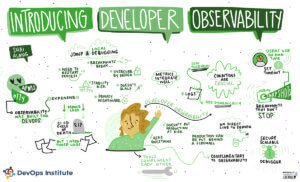
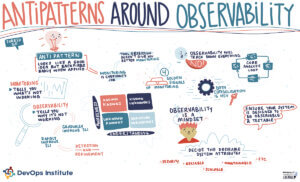
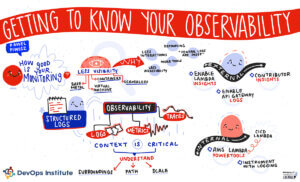
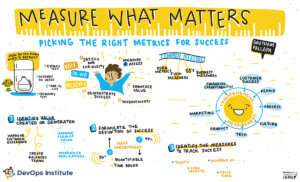
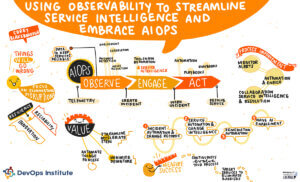
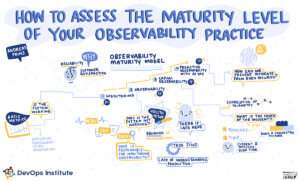


![[EP112] Why an AIOps Certification is Something You Should Think About](https://www.devopsinstitute.com/wp-content/uploads/2022/01/DOI-Human-DevOps-Digital-Podcast-Screen-600x600px-400x250.jpg)

